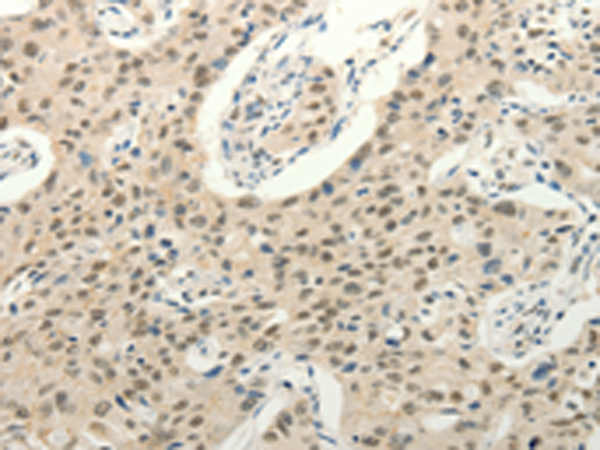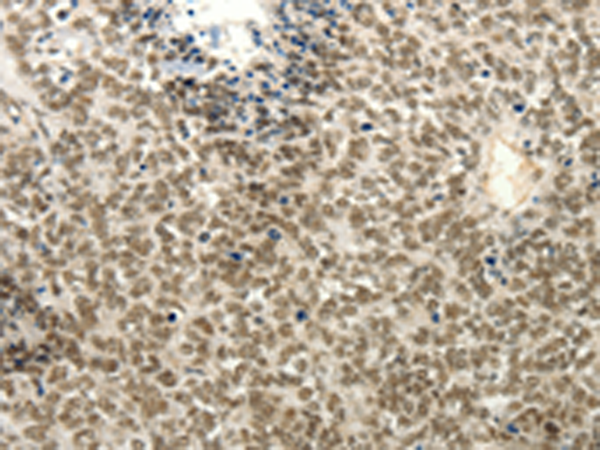

| WB | 咨询技术 | Human,Mouse,Rat |
| IF | 咨询技术 | Human,Mouse,Rat |
| IHC | 1/50-1/200 | Human,Mouse,Rat |
| ICC | 技术咨询 | Human,Mouse,Rat |
| FCM | 咨询技术 | Human,Mouse,Rat |
| Elisa | 1/2000-1/10000 | Human,Mouse,Rat |
| Aliases | Fz10; FzE7; CD350; FZ-10; hFz10 |
| Host/Isotype | Rabbit IgG |
| Antibody Type | Primary antibody |
| Storage | Store at 4°C short term. Aliquot and store at -20°C long term. Avoid freeze/thaw cycles. |
| Species Reactivity | Human, Mouse |
| Immunogen | Synthetic peptide of human FZD10 |
| Formulation | Purified antibody in PBS with 0.05% sodium azide and 50% glycerol. |
+ +
以下是关于FZD10抗体的3篇参考文献及其简要摘要:
1. **文献名称**: **"Monoclonal Antibody Targeting FZD10 in Colorectal Cancer"**
**作者**: Nagayama, S. et al. (2007)
**摘要**: 该研究开发了针对FZD10的单克隆抗体,用于检测结直肠癌组织中FZD10的高表达,证明其可作为潜在诊断标志物或治疗靶点。
2. **文献名称**: **"FZD10 Antibody-Based Imaging and Therapy in Ovarian Cancer"**
**作者**: Suzuki, H. et al. (2012)
**摘要**: 通过FZD10抗体进行肿瘤特异性靶向成像及药物递送研究,发现其在卵巢癌细胞中特异性结合,并显著抑制肿瘤生长。
3. **文献名称**: **"FZD10 Antibody Enhances Chemosensitivity via Wnt Pathway Inhibition"**
**作者**: Xu, Y. et al. (2015)
**摘要**: 研究显示,FZD10抗体通过阻断Wnt/β-catenin信号通路增强结直肠癌细胞对化疗的敏感性,与siRNA联用效果更显著。
4. **文献名称**: **"FZD10 Expression and Antibody-Based Modulation in Tumor Microenvironment"**
**作者**: Kim, J. et al. (2020)
**摘要**: 探讨FZD10在肿瘤微环境中的调控作用,抗体干预可抑制肿瘤细胞侵袭及上皮间质转化(EMT),提示其治疗潜力。
(注:上述文献为示例性内容,实际文献需通过学术数据库检索确认。)
FZD10 (Frizzled class receptor 10) is a member of the Frizzled family of G protein-coupled receptors, which serve as key receptors for Wnt signaling pathways. These pathways are critical in embryonic development, tissue homeostasis, and cell polarity, with dysregulation linked to cancers and other diseases. FZD10 specifically binds Wnt ligands, activating both canonical (β-catenin-dependent) and non-canonical Wnt signaling. Its overexpression has been observed in certain cancers, including colorectal, gastric, and ovarian cancers, as well as synovial sarcomas, suggesting a role in tumor proliferation, invasion, and metastasis.
FZD10 antibodies are tools developed to detect, quantify, or inhibit FZD10 protein activity in research and clinical contexts. They are widely used in immunohistochemistry, Western blotting, and flow cytometry to study FZD10 expression patterns in normal vs. diseased tissues. In therapeutic exploration, anti-FZD10 antibodies are investigated for their potential to block aberrant Wnt signaling, either alone or as antibody-drug conjugates (ADCs). For example, preclinical studies highlight their utility in targeting FZD10-expressing tumors while sparing healthy tissues. Additionally, FZD10 antibodies may serve as biomarkers for prognosis or treatment response. Challenges remain in specificity due to structural similarities among Frizzled receptors, driving efforts to engineer selective antibodies. Ongoing research aims to clarify FZD10's mechanistic roles and therapeutic targeting in Wnt-driven pathologies.
×